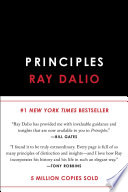

In 'Principles,' Ray Dalio shares the guiding philosophies and methodologies that have shaped his approach to life and business. The book is divided into three parts: the first part focuses on Dalio's personal journey an...
Continue readingThe foundation of Ray Dalio's philosophy is the importance of facing reality and dealing with it. This principle emphasizes the necessity of understanding the world as it is, rather than how we wish it to be. Dalio argue...
Continue readingDalio outlines a systematic approach to achieving goals, which he encapsulates in a 5-step process. The steps include: 1) Setting clear goals, 2) Identifying problems that stand in the way of achieving those goals, 3) Di...
Continue readingDalio advocates for radical truth and radical transparency as core principles in both personal and professional settings. Radical truth involves the commitment to honesty and openness in all communications, while radical...
Continue readingDalio emphasizes the importance of recognizing that individuals have different strengths, weaknesses, and perspectives. Understanding these differences can enhance collaboration and improve team dynamics. He introduces t...
Continue readingEffective decision-making is a critical skill that Dalio believes can be developed through structured approaches and frameworks. He discusses various decision-making techniques, including the use of algorithms and princi...
Continue readingDalio argues that failure is an inevitable part of success and emphasizes the importance of learning from mistakes. He introduces the concept of 'failing well,' which involves analyzing failures, understanding their caus...
Continue readingDalio emphasizes the importance of fostering a culture of continuous improvement within organizations. This principle involves encouraging individuals to seek feedback, reflect on their performance, and strive for person...
Continue readingThe reading time for Principles depends on the reader's pace. However, this concise book summary covers the 7 key ideas from Principles, allowing you to quickly understand the main concepts, insights, and practical applications in around 23 min.
Principles is definitely worth reading. The book covers essential topics including Embrace Reality and Deal with It, Use the 5-Step Process to Get What You Want, Radical Truth and Radical Transparency, providing practical insights and actionable advice. Whether you read the full book or our concise summary, Principles delivers valuable knowledge that can help you improve your understanding and apply these concepts in your personal or professional life.
Principles was written by Ray Dalio.
If you enjoyed Principles by Ray Dalio and want to explore similar topics or deepen your understanding, we highly recommend these related book summaries:
These books cover related themes, complementary concepts, and will help you build upon the knowledge gained from Principles. Each of these summaries provides concise insights that can further enhance your understanding and practical application of the ideas presented in Principles.